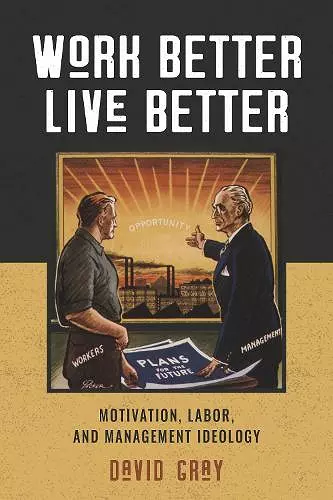Work Better, Live Better
Motivation, Labor, and Management Ideology
Format:Paperback
Publisher:University of Massachusetts Press
Published:30th Nov '20
Currently unavailable, and unfortunately no date known when it will be back

In the United States, a strong work ethic has long been upheld as a necessity, and tributes to motivation abound -- from the motivational posters that line the walls of the workplace to the self-help gurus who draw in millions of viewers online. Americans are repeatedly told they can achieve financial success and personal well-being by adopting a motivated attitude toward work. But where did this obsession come from? And whose interests does it serve?
Work Better, Live Better traces the rise of motivational rhetoric in the workplace across the expanse of two world wars, the Great Depression, and the Cold War. Beginning in the early twentieth century, managers recognized that force and coercion -- the traditional tools of workplace discipline -- inflamed industrial tensions, so they sought more subtle means of enlisting workers' cooperation. David Gray demonstrates how this "motivational project" became a highly orchestrated affair as managers and their allies deployed films, posters, and other media, and drew on the ideas of industrial psychologists and advertising specialists to advance their quests for power at the expense of worker and union interests.
Work Better, Live Better provides invaluable insight into how corporate management attempted to refashion the American work ethic in the twentieth century. An ambitious, intelligent, and thoughtful account of work and its ideological management that is essential reading for anyone interested in the history of capitalism." —Tim Strangleman, author of Voices of Guinness: An Oral History of the Park Royal Brewery
"By focusing on the idea of ‘motivation’ and the level of effort, energy, and engagement that managers have historically put into attempting to shape the inner psychic lives and experiences of workers, Gray renders strange and unusual some of the most familiar tropes of economic culture." —Kim Phillips-Fein, author of Invisible Hands: The Businessmen’s Crusade against the New Deal
ISBN: 9781625345349
Dimensions: unknown
Weight: 493g
368 pages